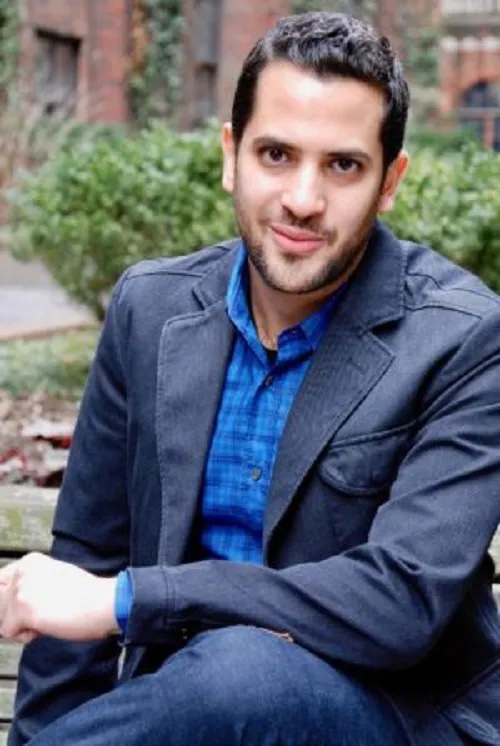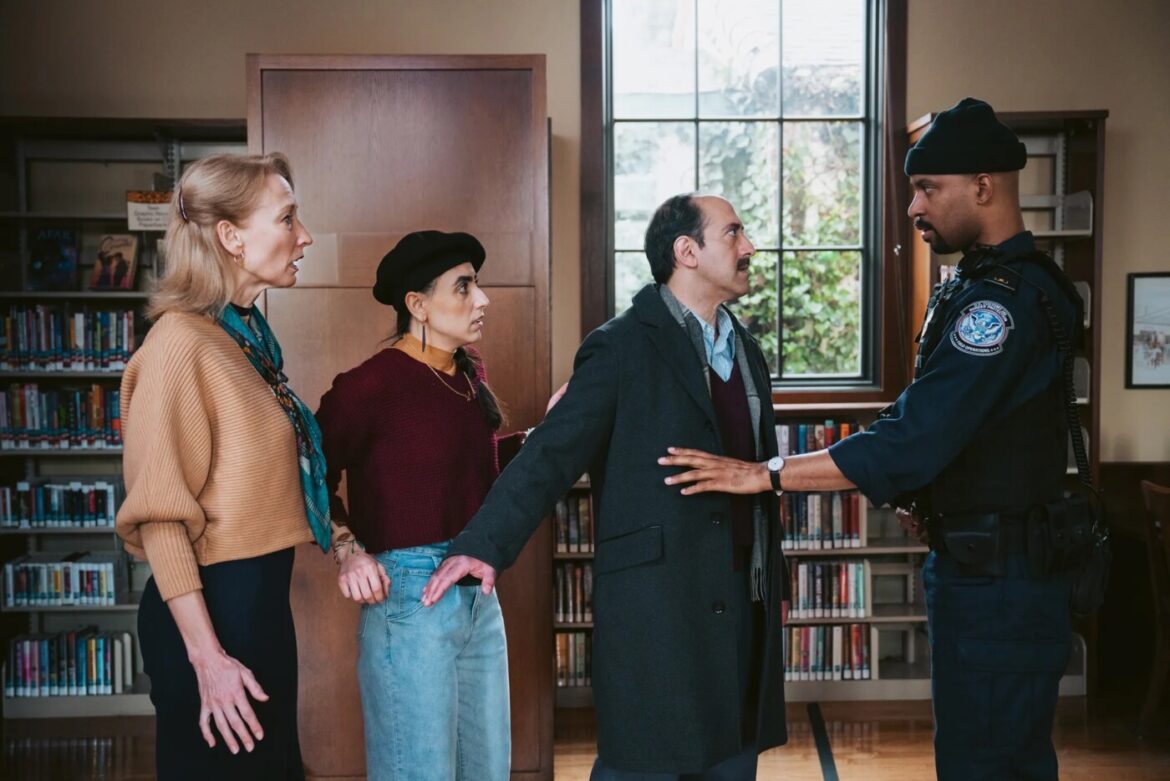When Canadian-born playwright Kareem Fahmy read a news article about the Haskell Free Library & Opera House, which is not far from where he grew up in Quebec, he was struck, he says, by what a beautiful and theatrical story it was.
Here was a library straddling two countries, a squiggly black tape line separating Derby Line, Vermont, and Stanstead, Quebec.
When then-president Trump enacted the Muslim ban in 2017—“Protecting the nation from foreign terrorist entry into the United States”—that library became a sort of sanctuary for Middle Easterners living in the United States on visas; they could safely meet friends and family in this liminal space without actually leaving the U.S. and risking the no-re-entry policy.
Reading about an Iranian family in those circumstances was the jumping-off point for Fahmy to envision a play that is at once a Canadian story, a Middle Eastern story and an American story.
“And here we are, all these years later,” he says joyfully in a recent phone call from the Peninsula, where his new play, “A Distinct Society,” is in rehearsal for its world premiere at TheatreWorks Silicon Valley, in a coproduction with Salt Lake City’s Pioneer Theatre. It first appeared at TheatreWorks in the company’s 2021 New Works Festival, held online only.
This is a busy season for Fahmy, who lives in New York, is the recipient of many fellowships, and is currently under commission at various theaters. Eight of his plays are opening at theater nationwide, something he never imagined could happen.
“A Distinct Society” goes on to Chicago after its Bay Area premiere, with Fahmy directing. As well as a playwright, he’s a longtime director with an master’s degree in directing from Columbia University and has helmed some of his own plays previously.
In “A Distinct Society,” an Iranian father (played by James Rana) and his daughter (Vaneh Assadourian), a medical student in the United States, arrange to meet in the neutral space of the library. Fahmy developed the increasingly complex tale over the years working with eight different theaters across the country. Who, other than the Iranians, would be in such a story? he wondered. And how could he make all of them as humanly complex as possible?
He created not just the father and daughter but also a U.S. Customs and Border Protection agent, who’s Black (Kenny Scott); and Declan, a lonely Canadian teenager born in Northern Ireland (Daniel Allitt).

Also, there is Manon the librarian (Carrie Paff), a middle-aged, white, Québecoise. In Quebec, the divisive 1995 vote, in which 49.42 percent favored secession from Canada (50.58 percent opposed), still rankles, so this central character is torn in several directions—just as all the characters are, each for reasons of their own.
It was the teenage boy that allowed Fahmy personal entry into the story. Like Declan, Fahmy’s parents were immigrants (from Egypt), and, like Declan (but not as geeky, he says), he was a fanatic of Green Lantern comics, even dressing up as the hero for Halloween.
He understands the immigrant experience in many ways: From his unique vantage point in a Muslim Egyptian family and as an English, French, and Arabic speaker in French-speaking Quebec, he can perceive the link between the politics of America in 2017 and those of Canada in the 1990s. (The term “a distinct society” was created to refer to the “French Canadian problem,” according to the Sanctuary for Independent Media.)
Director Giovanna Sardelli, who is TheatreWorks’ artistic associate and director of new works and has been at the helm throughout various iterations of the play, says, “We recognize who these characters are as people, how they are moving through the world the way most of us are—did we get through the day, did we hurt anybody? OK, let’s keep going.” This is not a political play, she stresses. It’s about how these characters are functioning inside a political system when they themselves are not political: “They’re just human beings trying to do the right thing.”
“The spectrum of emotion underlying everything in the universe became the underpinning of the play,” elaborates Fahmy.
It was important that the characters be neither heroes nor villains because, as he says, “There’s no such thing as pure good and pure evil”—that kind of thinking can lead to—well, to things like the Muslim ban.
If Fahmy is thrilled about the success of his plays, he is equally excited that the works of Middle Eastern playwrights are suddenly taking center stage across the nation (currently, for example, Berkeley Repertory Theatre is staging Sanaz Toossi’s “English”). He’s been an impassioned voice of support for the cause all along.
But it hasn’t always been like this. “There’s been a lot of misconceptions and reductive thinking that has hampered our community in very specific ways that other minority communities in theater haven’t faced,” he observes, “because of how politicized our culture has been.”
In 2020, before this sudden surge of visibility for Middle Eastern playwrights, he told OnStage Blog, “I think we’ll be in a much better place when we have a Middle Eastern version of ‘Crazy Rich Asians.’” What he meant, he explains now, is that, “We will have reached a different level when a Middle Eastern story can [for example] be about two people trying to find love”—plays that have nothing to do with post-9/11 political baggage. “Our stories should reflect our experience, not what a white American assumes to be the important stories of Middle Eastern culture.”
In giving full humanity and complexity to varied characters, “A Distinct Society” is exactly the kind of play he means.
TheatreWorks Silicon Valley’s “A Distinct Society” runs April 5-30 at Mountain View Center for the Performing Arts, 500 Castro St., Mountain View. Tickets are $30-$82. Call (877) 662-8978 or visit theatreworks.org.
